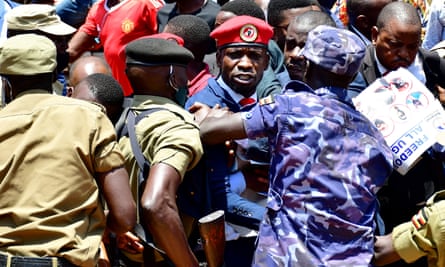The Uganda president, Yoweri Museveni, and his son Muhoozi Kainerugaba have been accused of sponsoring violence and abusing critics in harrowing testimony filed before the international criminal court.
The submissions contain detailed allegations of the torture of opposition figures and activists who report being arrested arbitrarily and being held incommunicado in “torture centres”, where they were reportedly interrogated about their links with the opposition figure Bobi Wine and subjected to physical harm and indignifying treatment.
The documents, containing testimonies of 215 people, were disclosed to the Guardian in a private briefing with the claimants’ lawyer Bruce Afran on Wednesday after a court filing in May, and support of a complaint made two years ago by Wine in connection with the country’s troubled 2021 elections. Nine top Ugandan officials were named.
Museveni, 78, who has ruled Uganda since 1986, has been implicated due to his role as commander-in-chief of the armed forces, while Kainerugaba, 49, has been accused of controlling the alleged torture centres.
“I was beaten badly on the face and every part of my body. They said to me: ‘Who are you to be against the president?,’” read one testimony given to lawyers by a Wine supporter, who reported having their toenails pierced with needles, being subjected to noise torture, having their teeth forcibly removed and being given electric shocks.
Most of the figures involved in the case have asked to remain anonymous because they are still in Uganda and fear for their safety. But a handful have gone public with their claims, including the Ugandan satirist Kakwenza Rukirabashaija and Amos Katumba, an associate of Wine’s who runs an organisation called Caring Hearts Uganda.
“It’s really hard when you try to raise your voice in Uganda to talk about what’s going on every day in our dear country,” said Katumba, who said even speaking about issues like healthcare and the high cost of living can put one in danger. “I wasn’t even in politics, which makes me worried because it means that no single Ugandan is safe,” he said.
Kainerugaba’s spokesperson, Andrew Mwenda, denied the general’s involvement in a text message to the New York Times, saying: “Were they tortured? YES! Who directed it? We need to find out. It makes sense for them to accuse a son of the president since it increases the profile of their case.”
Museveni’s deputy press secretary, Faruk Kirunda, also dismissed the claims against him, telling the NYT that the president’s political rivals were “peddling wrong information” at the international court to tarnish his image.
Afran said: “What we’ve seen is the complete loss of civil liberties and respect for human rights in Uganda in recent years under the Museveni regime. We are seeing literally hundreds of almost identical reports of abductions from the street, and various forms of gross and abusive torture.”
These include having chemicals being forced into people’s eyes, people being whipped with wires, and in some cases having testicles removed. “What we’re seeing is throughout the Ugandan governmental system, these forms of torture are being routinely used as to anyone active in any way in the political opposition, even low-level figures,” he said.
Wine, a singer turned politician, was Museveni’s main challenger in the 2021 elections. Museveni claimed victory in the contested polls.

Wine repeatedly claimed there was a systematic crackdown by the government against his campaign, which he says included “assassination attempts” against him. Wine is seen by some Ugandans as a symbol of resistance against Museveni’s decades-long rule, and has repeatedly called on other countries to make their economic dealings with Uganda conditional on its observance of certain human rights standards.
In the testimony submitted before the court, Katumba, who is living in the US where he was granted asylum, alleged he was confronted in his home in 2018 by men in plain clothes carrying guns who asked about his NGO’s activities.
He said the men said he had been seen in a Facebook video with Wine, who had spoken favourably about his organisation. Katumba said the men said they suspected the organisation was being used to “win the love of the Ugandan people” and to “funnel money from foreign countries in order to financially provide for Bobi Wine’s political future”.
Katumba reported the men kicked him in his genitals and kept him locked standing in a wooden holding box that had protruding nails, where he could not move without “tearing … flesh”.
He reported being left to stand there for 10 hours and then being placed neck-high in a tank of freezing cold water. He said that before he was released he was told by one of the men that he would have to become “a key witness against Bobi Wine … giving proof that the nonprofit was being used to destabilise President Museveni’s power and that Mr Wine was guilty of treason”.
“It’s important that the court takes this case because there’s a burgeoning use of such practices among central African countries, and without question in Uganda, where torture has become routine as a means of government,” said Afran.
The ICC has lost some sway in Africa within the last decade, as many countries on the continent threatened to leave it over its apparent disproportionate focus on prosecuting crimes occurring within Africa over those happening elsewhere in the world.
Uganda was among the countries threatening to leave the court. Museveni has previously expressed disdain for it, calling its officers “a bunch of useless people”. However, Uganda remains a party to the Rome statute, meaning the court can prosecute cases involving crimes against humanity that occur in the country.
The ICC is yet to decide if it will take on the case. Only a fraction of the cases submitted to it move forward.

